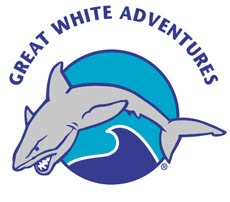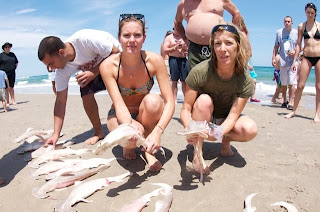From Mary Omalley:
Last Wednesday was a very sad day in Florida for sharks and those of us who are working hard to conserve them. Dr. Neil Hammerschlag's report on the
RJ Dunlap Marine Conservation Program blog sums up the day's events and the senseless waste of two pregnant sharks - a Great Hammerhead and a Bull Shark - and their 47 unborn pups.
Out of tragedies, however, there are usually some positive outcomes and lessons learned. Having had a few days to calm down and think about what has happened, following are some observations.
Positive outcomes:
1. Positive Media Coverage for Sharks:The media coverage of these incidents has been sympathetic across the board. The usual "monster" and "man-eater" terms have not been seen. The coverage of these incidents focused on the tragic lost and waste of beautiful animals that are vital to the ocean ecosystem. Brendal Davis and I, who attempted to save the pups from the Great Hammerhead that died in Delray Beach, were interviewed by the Sun Sentinel as well as the local CBS, NBC and ABC news affiliates. Not one reporter asked about shark attacks. They were interested in the importance of these animals to the ecosystem and the threats that sharks face. Each of them seemed genuinely saddened by the incidents. For example:
2. Public concern and support:
All of the onlookers gathered at the beach in Delray on Wednesday were saddened and shocked at the sight of the rare and beautiful female hammerhead and the 35 unborn pups that unfortunately were already dead when we got to them. Many people jumped in to help -- moving the massive shark out of the surf, cutting the shark to get to the pups, documenting with pictures and video (thank you Chloe!), and even the very unpleasant job of obtaining biological samples for shark research. Several people offered to participate in beach patrols to watch for and report illegal shark fishing on the beach. THANK YOU!!
3. Educational opportunity:
The questions that day at the beach were non-stop. People were eager to learn more about sharks and we took this opportunity to inform them that these animals are not only endangered, but are vital to the health of our oceans. I think that a number of people went home that day with a new respect and appreciation for sharks. Fear and misunderstanding was replaced with sympathy. One man at the scene commented that he would not want to run into a shark like that while diving, and then actually saw a Great Hammerhead later that afternoon on a dive! See this quote from the Sun Sentinel:
'Recreational diver Scott Williams, 35, of Delray Beach, had the rare opportunity of seeing the deceased shark, then a few hours later seeing a live one while diving about a mile off shore. After seeing the size of the dead one, he hoped to never run into one under the sea. But when he did, from a 30-yard distance, he was enchanted. The full-grown shark took a look at him, then craned its massive head back down, apparently looking for food. "It was elegant. I wasn't scared like I thought I would be," Williams said. "It was real docile. It didn't seem aggressive in any way. I was awestruck."'
4. Productive discussion about improving catch and release fishing gear and practices:
Comments on the RJ Dunlap blog have spurred a healthy dialogue among members of the recreational fishing community. Some examples:
Capt. Bill Hardy of Berightback Charters commented: "Any useless and senseless destruction of life in our precious and fragile ocean ecosystem must be eliminated ....... Through study and education, we may have a chance to preserve our ocean."
George Campbell commented: "As a fisherman and advocate for sustainable catch and release shark fishing, I have to say that this is a tremendous loss." And he goes on to explain steps that "responsible fisherman can take to protect these animals while fishing".
Captain Curt Slonim of Curtasea Charters commented: "I would ask that you just take a moment to consider making the following changes within the club; mandate Circle hooks, take measurements and photos in a minimum of waist deep water, partner with a credited Research Organization, and take Shark Tournaments off of the calendar during the time of year that is known for Shark birthing."
c.uva commented: "Recreational fishing for sharks does affect the population whether it be landbased or boat based, there are ways to improve the catch and release survivabillity of sharks. I ASK SEVERAL SCIENTESTS TO COME FOWARD TO WORK ALONGSIDE REACREATIONAL SHARK FISHERMAN .... TO DECREASE MORTALITY RATES OF RELEASED SHARKS."
I would say this sounds like a great opportunity!
Recreational fishing is one of the largest contributors to Florida's economy. The vast majority of these fishermen are ethical, responsible and keenly aware of the need to protect our precious marine resources. There is definitely a need for more education on the value of these animals to the ecosystem, the life history characteristics and population status of Threatened shark species as well as gear and handling techniques to reduce stress, injury and post release mortality. Since the dialogue has now started, we need to keep it going and take this opportunity to make things better.
Lessons Learned:
1. Circle Hooks need to be a requirement. Florida will consider a proposal to require circle hooks this year, which is a great step, but circle hooks should be required everywhere. J Hooks, which were used in both of Wednesday's incidents, often result in "gut-hooking" when the shark swallows the bait and the hook catches and tears internal organs. With circle hooks, the shark is hooked in the corner of the mouth, making the hook easier to remove and preventing the often fatal injuries caused by gut hooking or hooking the gills.
2. Regulations to protect pregnant female sharks during pupping season should be explored. Florida's coasts serve as vital breeding and pupping grounds - or Essential Fish Habitats - for several sharks species. During the Spring and early Summer, pregnant females come to these inshore areas to give birth to their pups. I honestly don't know what the appropriate regulation would be to protect these females during the pupping season. Two of the charter boat fishing captains who commented on the RJ Dunlap blog suggested either restricting land based fishing for sharks during this time of year or at least not holding land based shark tournaments during this time. Obviously more discussion is needed to come up with a rule that will adequately protect the pregnant females with the least negative impact on fishermen.
What I am sure of, though, is that every one of these mature reproductive females is extremely important. Research by Dr. Gruber's team and other shark scientists has demonstrated that a very small number of these breeders is responsible for maintaining the population for their species over a very broad area. The loss of just one of these mature females, especially a pregnant one, can seriously impact the population.
3. Hammerheads need more protection. The US and Palau recently proposed protection for hammerhead sharks under CITES, yet no hammerhead species is protected in US waters. Three types of hammerheads are classified as Threatened by the IUCN Shark Specialist Group -- Great Hammerheads -- Endangered - Very High Risk of Extintion; Scalloped Hammerheads -- Endangered -- Very High Risk of Extinction and Smooth Hammerhead - Vulnerable -- High Risk of Extinction. In addition, hammerheads are considered by scientists and fishermen to be among the most fragile species, which suffer extremely high post release mortality, both from commercial and recreational fishing. See this quote from Dr. Neil Hammerschlag, Director of the RJ Dunlap Marine Conservation Program at University of Miami. In the course of his research Dr. Hammerschlag has had the opportunity to observe and participate in the catch and release of thousands of sharks of many different species.
"Based on observations of hammerheads, compared with other sharks, when they are caught on rod & reel, they exert a tremendous amount of energy to fight the angler. They try to sprint (instead of jog) the marathon of the fishing event..so they become quickly stressed and over-exerted. There are both behavioral and physiological effects that increase their vulnerability at this stage. While fighting on a line, their normal swimming ability is greatly impaired, making it difficult for them to ram ventalate (pump water over their gills) as well as offload CO2. Thus, CO2 and subsequent lactate concentrations build up in their blood. which greatly increases capture stress and post-release mortality."
In addition many recreational shark fishermen attest that hammerheads very often die on the line and are much more susceptible to mortality than other shark species.
Because of this extreme fragility, I believe hammerheads should not only be Prohibited Species, but perhaps should be also be given protection under the Endangered Species Act. With ESA protection, any hammerhead accidentally hooked would have to be immediately cut loose, as is the case with smalltooth sawfish.
4. Enforcement should be improved. The agencies responsible for enforcement have limited budgets and personnel. Despite these difficulties, however, efforts could be improved. Education for enforcement personnel on what the regulations are, how to identify violators, and the importance of enforcing the regulations would help. Education and coordination of public volunteers to assist with enforcement could also relieve some of the pressure on these stressed agencies. We in the conservation community can help this area.
5. More study is needed on Catch and Release stress and mortality. According to NOAA Fisheries reports, approximately 550,000 sharks were harvested and another 14 million sharks were caught and released alive by recreational anglers in the US in 2007. And NMFS estimates that at least 20% of released fish end up dying. This works out to 14 million @ 20% = 2.8 million sharks + 550,000 = over 3.3 million sharks. Commercial shark landings in 2007 in the US totaled 15 million pounds. Using an estimated average weight of 10 lbs per shark, this works out to an estimated 1.5 million sharks. If the 20% mortality figure is correct, then the recreational fishing impact on sharks may be more than double that of commercial shark fisheries in the US. And the bulk of that number comes from well-meaning people who don't even intend to kill the animals!
These numbers should a provide a big incentive to fund research aimed at understanding the causes of post release mortality and reducing it.















